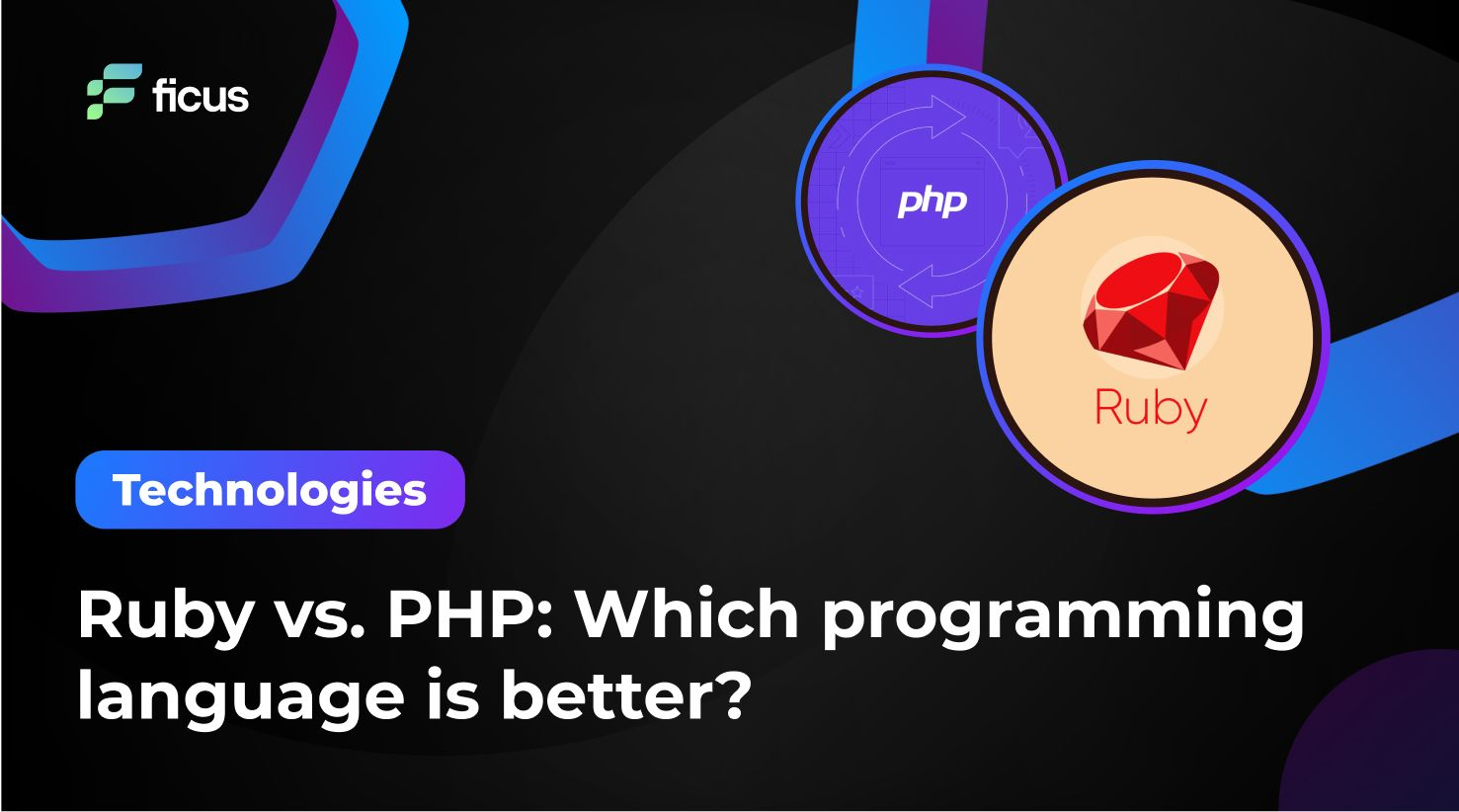Are you thinking of learning a new programming language? Great! But with so many different languages, which one should you pick? In this article, we’ll compare two of the most popular programming languages: Ruby vs. PHP. We’ll look at their features, popularity, and development communities to help you decide which is right. Ready to get started? Let’s go!
PHP and Ruby are two of the most popular programming languages today. Both have their fans and detractors, but which one is the best? In this article, we’ll look at some of the key differences between PHP and Ruby to help you decide which language is right for you.
If you’re a web developer, you’ve probably heard of PHP and Ruby. These two programming languages are popular choices for building dynamic websites. But what are the differences between them? PHP is a server-side scripting language, meaning that it runs on the web server and generates HTML pages for the user. On the other hand, Ruby is a general-purpose programming language that can be used for server-side and client-side development.
Ruby code is executed on the server, but it can also be embedded in HTML pages to provide interactive features. As a result, Ruby applications are often more complex than those written in PHP. However, Ruby’s popularity has grown in recent years due to its flexibility and ease of use. If you’re deciding which language to learn, it’s important to consider your specific needs and goals. But both PHP and Ruby offer powerful tools for creating dynamic websites.
- Comparison of Ruby and PHP for web development.
- Consider project needs, language features, and development community.
- PHP is generally faster than Ruby; Ruby offers readability advantages.
History
PHP and Ruby are two of the most popular programming languages in use today. Though they share some similarities, they each have a unique history that has shaped their development and use.
PHP was originally created in 1994. Over time, PHPs have expanded their functionality, adding support for database interaction and user-defined functions. PHP has undergone continual development, with a large and active community of contributors. Today, many websites use PHP, including some of the most popular sites on the Internet, such as Facebook and Wikipedia.
Ruby was created in 1995 by Japanese programmer Yukihiro Matsumoto. Matsumoto was primarily inspired by Smalltalk when designing Ruby. He sought to create a language that balanced functionality with ease of use, and Ruby’s syntax reflects this goal, designed to be natural and intuitive for programmers. Since its release, Ruby has been used in a wide range of projects, from simple command-line scripts to large-scale web applications.
Ruby
Ruby web development has become one of the most popular languages for web development thanks to its ease of use and robust feature set. Here are seven essential points about Ruby that every programmer should know:
- Ruby is a universal language that can be used for developing web applications, command-line applications, and even desktop applications.
- Ruby code is easy to read and understand, making it ideal for beginners.
- Ruby comes with an extensive standard library that includes everything from basic data structures to advanced networking functionality.
- Ruby is highly extensible, allowing programmers to add new features and functionality as needed.
- Ruby’s object-oriented features make it easy to create modular and reusable code.
- Ruby is well suited for both small and large projects. Its flexibility means that it can be easily scaled up or down as needed.
- Thanks to its popularity, there is a large community of Ruby programmers who are always willing to help with coding problems or questions.
PHP
- PHP is a case-sensitive web development language, which means that variable names and function names are case-sensitive. For example, the variable $myvar differs from the variable $MyVar.
- PHP is an object-oriented language, meaning you can create objects and call methods on them. However, PHP also provides a procedural programming interface, meaning you can write code without using objects.
- PHP has a rich set of built-in functions, which you can use to perform various tasks such as string manipulation, math operations, file system access, etc.
- PHP also supports the concept of arrays, which are variables that can store multiple values. For example, you could create an array of integers or an array of strings.
- PHP provides support for many databases, such as MySQL, PostgreSQL, Oracle, etc. This means that you can easily store and retrieve data from a database using PHP.
- PHP is a very versatile scripting language and can be used for developing both small and large applications.
- Finally, PHP is free software released under the terms of the GNU General Public License (GPL). This means that you can freely use, modify, and redistribute PHP without having to pay anything.
PHP Programming language
PHP is a powerful programming language that can be used to create dynamic web pages. PHP code is executed on the server, and the results are then returned to the browser. PHP is best known for its ability to generate HTML pages dynamically, but it can also be used to create images, PDF files, and even Flash movies. PHP is free to download and use, and it runs on all major operating systems, including Windows, Linux, and Mac OS X. With its ease of use and flexibility, PHP has become one of the most popular programming languages in the world.
Ruby Programming Language
Ruby is a programming language that was designed to be simple yet powerful. Ruby is used in many applications, from web development to data analysis. It is also the language powering the famous Ruby on Rails web framework. While it is not as widely used as some other languages, Ruby has a strong and loyal community of users who appreciate its versatility. Whether you’re just getting started with programming or are looking for a language that can power your next big project, Ruby is definitely worth considering.
Differences Between Ruby vs. PHPs
When it comes to choosing a programming language, there are many factors to consider. Cost, performance, scalability, and readability are just a few of the factors that can influence your decision. Two of the most popular languages for web development are Ruby and PHP. Although they share some similarities, there are also several key differences between the two languages.
Ruby is a general-purpose programming language that was designed with developer productivity in mind. It is well suited for rapid application development and features a concise syntax that makes code easy to read and maintain.
In contrast, PHP is a server-side scripting language that is primarily used for developing dynamic web pages. PHP code is often embedded directly into HTML markup, making it less readable than Ruby. However, PHP offers a number of powerful features that make it an attractive choice for web development, such as support for databases and cookies.
When deciding between Ruby and PHP, it is crucial to consider the specific needs of your project. If you require a language that is easy to learn and write, Ruby may be the best choice.
What are the differences Between Ruby vs PHP?
Both Ruby and PHP are popular programming languages that can be used for developing a wide range of applications. However, there are some important differences between the two languages that should be considered when choosing which one to use. Perhaps the most significant difference is that Ruby is an object-oriented language, while PHP is not. This means that Ruby code is organized around objects and classes, while PHP code does not make use of these concepts.
- As a result, Ruby code tends to be more intuitive and easier to read than PHP code.
- Another important difference between the two languages is their approach to web development.
- Ruby on Rails is a popular web development framework that provides a comprehensive set of tools for quickly building dynamic websites.
- In contrast, PHP does not have a single standard framework, although there are several widely used options (such as Laravel and Symfony).
- This can make PHP slightly more difficult to learn for newcomers, but it also gives experienced developers more flexibility in how they structure their code.
What language is similar to Ruby on Rails?
Ruby on Rails is a web development framework written in the Ruby programming language. It is designed to make development faster and easier by providing a set of common patterns and conventions. As a result, it is sometimes compared to other web development frameworks such as Laravel and Django. However, there are also some significant differences between Ruby on Rails and these other frameworks.
For example, Ruby on Rails uses an MVC architecture, while Laravel employs a more flexible approach. Additionally, Django provides more built-in features than Ruby on Rails, but this can also make it more complex to use. Ultimately, the best way to decide whether Ruby on Rails is right for you is to try it out and see how it feels.
Looking for a software development company?
Contact usIs Ruby slower than PHP?
The debate between Ruby and PHP has been going on for years, with no clear winner in sight. Both languages have their pros and cons, and it really depends on your specific needs as a programmer. However, when it comes to speed, there is a general consensus that PHP is faster than Ruby. This is because PHP is a compiled language, while Ruby is an interpreted language.
This means that PHP code is converted into machine code before it is executed, while Ruby code is read and processed by the interpreter at runtime. As a result, PHP programs tend to run faster than their Ruby counterparts. Of course, this is not always the case, and there are exceptions to every rule. But if speed is your top priority, then PHP is likely to be the better choice.
What languages are replacing PHP?
While PHP has been one of the most popular languages for web development for many years, it is now being increasingly replaced by newer languages such as Python and Ruby. These languages are more powerful and flexible than PHP, and they are also much easier to learn. In addition, they are better suited to modern web development frameworks such as Django and Rails. As a result, we will likely see a continued decline in the popularity of PHP in the years to come.
Ruby offers elegant and concise syntax, promoting readability and developer productivity. Ruby on Rails, a popular web framework, accelerates development with built-in features and conventions. It emphasizes convention over configuration (CoC) and follows the don’t repeat yourself (DRY) principle, reducing code duplication. Ruby’s active and supportive community continually updates its libraries and gems, enhancing its ecosystem.
PHP has a long-standing presence on the web, making it widely supported by hosting providers and compatible with various databases. It excels in server-side scripting, making it versatile for web applications. PHP boasts a massive developer community, resulting in extensive documentation and numerous resources. Additionally, PHP frameworks like Laravel and Symfony provide modern development tools and features for building robust web applications.









The author’s unbiased approach and in-depth analysis of factors such as performance, scalability, community support, and syntax clarity provide developers with valuable insights. The article’s clarity, logical reasoning, and practical examples make it an essential resource for anyone struggling with the Ruby vs. PHP decision. Thanks for the article!
Thanks to the author for the article. This well-thought-out piece provides an insightful comparison between Ruby and PHP, helping developers make an informed decision. The author skillfully evaluates various aspects such as performance, scalability, community support, and ecosystem, offering a comprehensive view of each language’s strengths and weaknesses. The article’s clarity, logical reasoning, and unbiased approach make it a valuable resource for developers navigating the Ruby vs. PHP dilemma.
This well-researched and balanced comparison sheds light on the strengths and weaknesses of both Ruby and PHP. The author’s thorough analysis of factors such as performance, community support, and ease of use gives readers a comprehensive understanding of each language. The article’s clarity, objective analysis, and practical examples make it a valuable resource for developers who need help. The author’s expertise in this topic is obvious, making this article a must read for anyone considering Ruby or PHP.